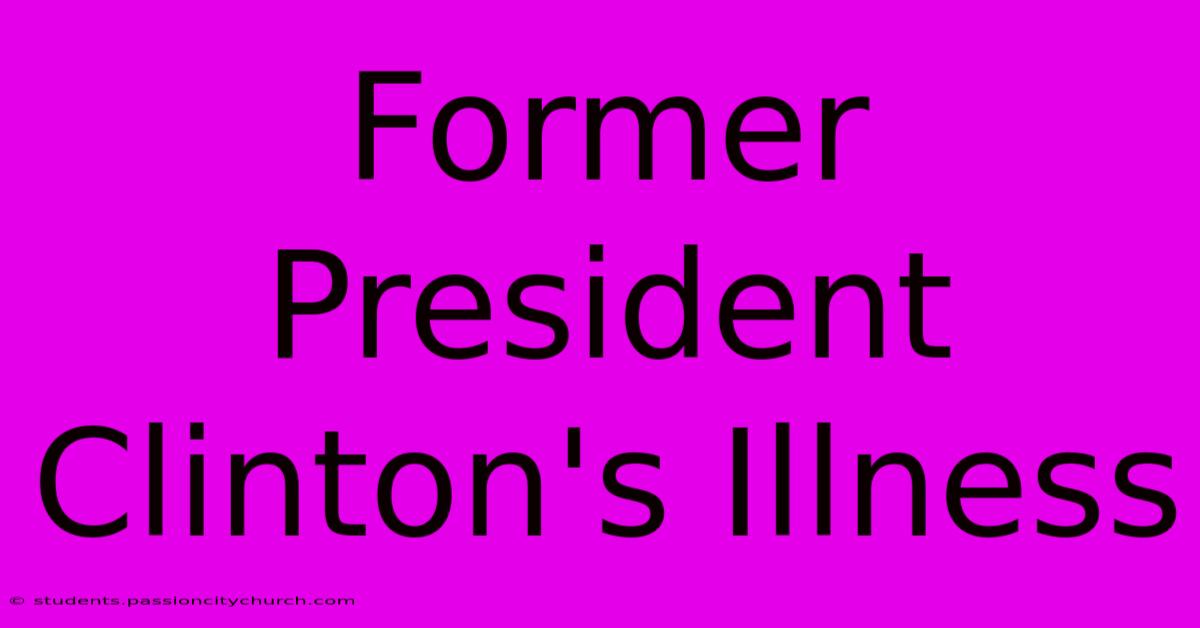Former President Clinton's Illness

Discover more detailed and exciting information on our website. Click the link below to start your adventure: Visit Best Website. Don't miss out!
Table of Contents
Former President Clinton's Health: A Timeline of Illnesses and Recovery
Former President Bill Clinton has enjoyed a long and impactful life in public service, but his journey has not been without significant health challenges. Understanding his health history provides insight not only into his personal resilience but also into the broader context of preventative care and the management of complex medical conditions. This article will explore the key illnesses President Clinton has faced, highlighting the treatments received and the lessons learned from his experiences.
Early Life and Health:
While specific details of President Clinton's early health are limited publicly, his generally active lifestyle and participation in sports suggest a relatively healthy childhood and youth. However, like many individuals, he faced periods of illness and minor health concerns throughout his life before entering the national spotlight. It's crucial to remember that without detailed medical records released with his consent, any speculation on his earlier health is just that—speculation.
The Heart Attack and Subsequent Cardiac Issues (2004):
Arguably the most widely known health crisis in President Clinton's life occurred in 2004 when he suffered a heart attack. This event brought his health into sharp public focus and highlighted the importance of cardiovascular health, especially for individuals under stress. The event involved a blockage in his coronary artery, requiring immediate medical intervention.
This wasn't just a single event; it marked the beginning of a prolonged period of focusing on heart health management. Following the heart attack, President Clinton underwent a procedure to open the blocked artery. This involved angioplasty and the placement of stents to maintain blood flow. The details of his recovery, while not fully public, emphasized the crucial role of lifestyle changes, including diet and exercise, in managing cardiac health post-intervention. His subsequent advocacy for heart health awareness campaigns stands as a testament to his personal experience.
The Blood Clot (2010):
Several years later, President Clinton experienced a blood clot near his heart. While less dramatic than the heart attack, this event underscored the ongoing challenges individuals face in managing heart health. Blood clots can be serious and can lead to significant complications, highlighting the importance of consistent medical monitoring and adherence to prescribed treatments. Again, details regarding the specific treatment remain largely private, but the incident further cemented his commitment to preventative healthcare.
Additional Health Concerns and Speculation:
Beyond the well-documented heart-related issues, various media outlets have speculated on other potential health concerns faced by the former president. However, without official confirmation from medical professionals or President Clinton himself, it’s irresponsible to dwell on unsubstantiated claims. Respect for privacy and responsible journalism are paramount when discussing an individual's health status.
The Importance of Preventative Care:
President Clinton's health journey powerfully illustrates the critical role of preventative care. While genetics play a part, lifestyle choices significantly influence cardiovascular health. His experience underscores the importance of regular check-ups, healthy eating habits, maintaining a healthy weight, and regular exercise. His advocacy for heart health after his own experiences has undoubtedly saved lives.
Lessons Learned and Public Impact:
President Clinton's health journey provides valuable lessons for the public:
- Openness and transparency (within privacy boundaries): While maintaining personal privacy, his willingness to acknowledge his health struggles has destigmatized discussions surrounding heart health.
- The power of lifestyle changes: His post-heart attack focus on diet and exercise demonstrates how lifestyle adjustments can significantly impact long-term health.
- The importance of ongoing medical monitoring: His experience highlights the need for regular check-ups and proactive management of health conditions.
- Advocacy for preventative care: His public engagement in health awareness campaigns encourages others to prioritize their well-being.
Conclusion:
Former President Bill Clinton's health experiences offer a profound case study in both the challenges and resilience of managing complex medical conditions. His story serves as a powerful reminder of the importance of preventative care, healthy living, and the significance of addressing health issues proactively. While specific details of his medical history remain private, his public advocacy for heart health and his commitment to a healthier lifestyle continue to inspire positive change. His journey is a testament to the human spirit's ability to overcome adversity and to the crucial role of medical advancements and personal responsibility in maintaining health and well-being. The focus should always be on promoting healthy lifestyles and preventative measures to minimize future health risks, lessons learned directly from President Clinton's own health journey.

Thank you for visiting our website wich cover about Former President Clinton's Illness. We hope the information provided has been useful to you. Feel free to contact us if you have any questions or need further assistance. See you next time and dont miss to bookmark.
Also read the following articles
| Article Title | Date |
|---|---|
| Inter Vs Como En Vivo Guia Para Ver El Partido | Dec 24, 2024 |
| Pppk Tahap 1 Lihat Hasil Hari Ini | Dec 24, 2024 |
| 2024 Primetime Five Key Moments | Dec 24, 2024 |
| Norad Follow Santa In Real Time | Dec 24, 2024 |
| Sources Buehler Signs With Red Sox 21 M | Dec 24, 2024 |
| Packers Clinch Playoff Bid | Dec 24, 2024 |
| 2025 Nfl Draft Order Team Standings | Dec 24, 2024 |
| Benfica Na Lideranca Apos Vitoria Sobre Estoril | Dec 24, 2024 |
| Salpicao De Camarao Chef Elia Schramm | Dec 24, 2024 |
| Week 17 Vikings Packers In Late Window | Dec 24, 2024 |
